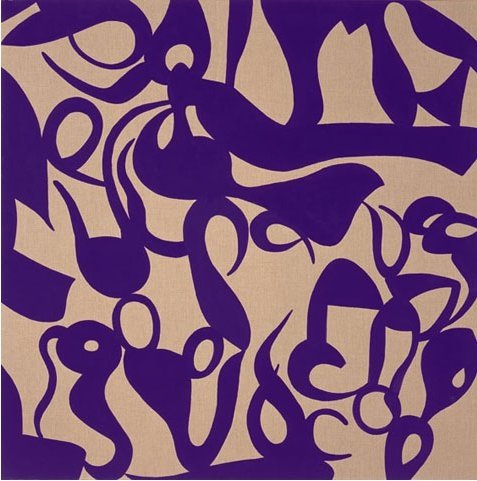Carla Accardi
dal 9/5/2010 al 25/6/2010
Segnalato da
Bettina Prentice Communications
9/5/2010
Carla Accardi
Haunch of Venison, New York
One of the key figures of abstract art in Italy during the second half of the 20th century. The exhibition, organized by art historian and critic Adachiara Zevi, includes works from the mid-1950s to the present, including several new works made specifically for this occasion. Accardi is best known for developing a unique lexicon of 'signs', fictional abstracted calligraphic marks used in repetition to communicate shifting dualities. The combination keeps her paintings dynamic and changing.

Haunch of Venison is pleased to announce an exhibition by Carla Accardi, one of the key
figures of abstract art in Italy during the second half of the twentieth century. The exhibition,
organized by art historian and critic Adachiara Zevi, includes works from the mid-1950s to the
present, including several new works made specifically for this exhibition.
In a 2005 article in the New York Times esteemed art critic Roberta Smith described Carla
Accardi as "art star on the order of Agnes Martin in Italy." Struggling against Italy's patriarchal
hegemony throughout her career, it is notable that in the early 1950s Accardi was the only
female artist being exhibited alongside Burri, Fontana and Moreni. Although her recognition
came primarily from Europe, American audiences have, in recent years, begun to grasp the
range of Accardi's influence. Artforum's Brian Sholis recently encouraged his readers to begin
paying Accardi "the attention and respect that she deserves."
Accardi is best known for developing a unique lexicon of 'signs', fictional abstracted calligraphic marks used in repetition to communicate shifting dualities. When combined with her
colorful or monochromatic surfaces the result is unlimited amalgamations that allow the artist
to showcase the endless possibilities available through abstraction. The combination keeps
Accardi's paintings dynamic and changing. It is this dynamism that significantly influenced
many of the Arte Povera artists in Italy and throughout Europe.
A central figure of the Italian Avant-Garde movement, Accardi has been making work for over
sixty years. Highlights of this exhibition include two rare black and white paintings from the
1950s, a period in which the artist worked exclusively in the minimalist palette in a controlled
response to Jackson Pollock. This period also marked, in the words of Germano Celant:
"a convergence on the canvas of vibrations and oscillations of tender, sensual shapes that
went together with the idea of flow and the curved, organic development of forms." Another
highlight of the exhibition is a brightly colored painting from the 1960s, a period that marks
Accardi's reintroduction of highly contrasting, bold colors and wide use of Sicofoil, an innovative clear plastic sheeting that allowed her luminous marks to 'float' in midair.
Also included in the exhibition will be seminal works on loan from prestigious collections,
including the Castle of Rivoli Contemporary Art Museum, which will lend its collection of
Sicofoil 'Rolls'. Equally notable is the recreation of Accardi's Labyrinth House in Haunch of
Venison's New York space. This life-size structure, made in 2000, is constructed of frames and
panels in Perspex and measures over 16 feet in height. Curtain from 1965 and Triple Curtain
from 1969, both works that led the artist to explore beyond painting, will also be exhibited. The
core of new work will focus on Accardi's use of black and white color palette in conjunction
with the texture inherent in coarse canvas.
Born in 1924 in the small Sicilian village of Trapani, Accardi rose to fame as a co-founder,
along with Piero Dorazio and other highly influential artists, of the Forma 1 movement. Forma 1
identified itself as a reaction against twenty years of oppressive Fascist regime and embraced
the principals of both Futurism and Marxism. Accardi has had countless exhibitions worldwide
including a retrospective at the Rivoli Museum, a major exhibition at the Musée d'Art Moderne
de la Ville de Paris in 2002 curated by Laurence Bosse and Hans Ulbrich Olbrist, a retrospective at PS1 Contemporary Art Center in New York, and exhibitions at the MACRO in Rome and
the Moscow Museum of Modern Art. Accardi was also featured in Wack! Art of the Feminist
Revolution and has had three solo exhibitions at the Venice Biennale.
A fully illustrated catalogue will accompany the exhibition.
Image: Viola d'Egitto, 2008. Acrylic on canvas 160 x 160 cm (63 x 63 in.)
For further information please contact Bettina Prentice Communications: (212) 228-4048 or info@bettinaprentice.com
Private View: May 10, 6-8 pm
Haunch of Venison
1230 Avenue of the Americas 20th Floor New York, NY 10020
Hours: 10.00-18.00 Tue - Sat
Or by appointment



